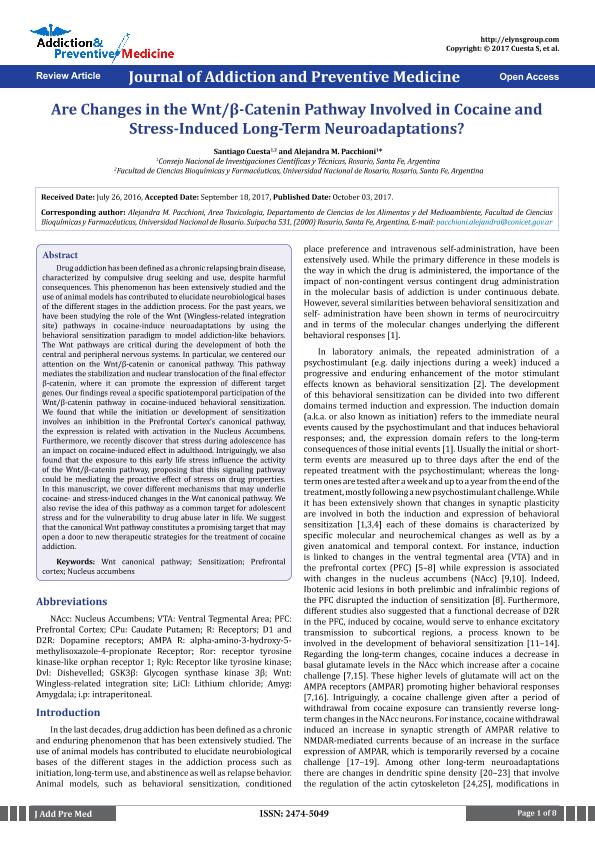Mostrar el registro sencillo del ítem
dc.contributor.author
Cuesta, Santiago

dc.contributor.author
Pacchioni, Alejandra Maria

dc.date.available
2019-06-24T19:44:53Z
dc.date.issued
2017-10
dc.identifier.citation
Cuesta, Santiago; Pacchioni, Alejandra Maria; Are changes in the wnt/b-catenin pathway involved in cocaine and stress-induced long-term neuroadaptations?; Elyns Publishing group; Journal of Addiction and Preventive Medicine; 2; 2; 10-2017; 1-8
dc.identifier.issn
2474-5049
dc.identifier.uri
http://hdl.handle.net/11336/78755
dc.description.abstract
Drug addiction has been defined as a chronic relapsing brain disease, characterized by compulsive drug seeking and use, despite harmful consequences. This phenomenon has been extensively studied and the use of animal models has contributed to elucidate neurobiological bases of the different stages in the addiction process. For the past years, we have been studying the role of the Wnt (Wingless-related integration site) pathways in cocaine-induce neuroadaptations by using the behavioral sensitization paradigm to model addiction-like behaviors. The Wnt pathways are critical during the development of both the central and peripheral nervous systems. In particular, we centered our attention on the Wnt/β-catenin or canonical pathway. This pathway mediates the stabilization and nuclear translocation of the final effector β-catenin, where it can promote the expression of different target genes. Our findings reveal a specific spatiotemporal participation of the Wnt/β-catenin pathway in cocaine-induced behavioral sensitization. We found that while the initiation or development of sensitization involves an inhibition in the Prefrontal Cortex?s canonical pathway, the expression is related with activation in the Nucleus Accumbens. Furthermore, we recently discover that stress during adolescence has an impact on cocaine-induced effect in adulthood. Intriguingly, we also found that the exposure to this early life stress influence the activity of the Wnt/β-catenin pathway, proposing that this signaling pathway could be mediating the proactive effect of stress on drug properties. In this manuscript, we cover different mechanisms that may underlie cocaine- and stress-induced changes in the Wnt canonical pathway. We also revise the idea of this pathway as a common target for adolescent stress and for the vulnerability to drug abuse later in life. We suggest that the canonical Wnt pathway constitutes a promising target that may open a door to new therapeutic strategies for the treatment of cocaine addiction.
dc.format
application/pdf
dc.language.iso
eng
dc.publisher
Elyns Publishing group
dc.rights
info:eu-repo/semantics/openAccess
dc.rights.uri
https://creativecommons.org/licenses/by/2.5/ar/
dc.subject
Wnt Canonical Pathway
dc.subject
Sensitization
dc.subject
Prefrontal Cortex
dc.subject
Nucleus Accumbens
dc.subject.classification
Salud Ocupacional

dc.subject.classification
Ciencias de la Salud

dc.subject.classification
CIENCIAS MÉDICAS Y DE LA SALUD

dc.title
Are changes in the wnt/b-catenin pathway involved in cocaine and stress-induced long-term neuroadaptations?
dc.type
info:eu-repo/semantics/article
dc.type
info:ar-repo/semantics/artículo
dc.type
info:eu-repo/semantics/publishedVersion
dc.date.updated
2019-04-23T19:53:19Z
dc.identifier.eissn
2474-5049
dc.journal.volume
2
dc.journal.number
2
dc.journal.pagination
1-8
dc.journal.pais
Estados Unidos

dc.journal.ciudad
Nueva Jersey
dc.description.fil
Fil: Cuesta, Santiago. Consejo Nacional de Investigaciones Científicas y Técnicas. Centro Científico Tecnológico Conicet - Rosario; Argentina. Universidad Nacional de Rosario. Facultad de Ciencias Bioquímicas y Farmacéuticas. Laboratorio de Toxicología Experimental; Argentina
dc.description.fil
Fil: Pacchioni, Alejandra Maria. Consejo Nacional de Investigaciones Científicas y Técnicas. Centro Científico Tecnológico Conicet - Rosario; Argentina. Universidad Nacional de Rosario. Facultad de Ciencias Bioquímicas y Farmacéuticas. Laboratorio de Toxicología Experimental; Argentina
dc.journal.title
Journal of Addiction and Preventive Medicine
dc.relation.alternativeid
info:eu-repo/semantics/altIdentifier/url/https://www.elynspublishing.com/journal/article/are-changes-in-the-wnt-catenin-pathway-involved-in-cocaine-and-stress-induced-long-term-neuroadaptations
Archivos asociados
